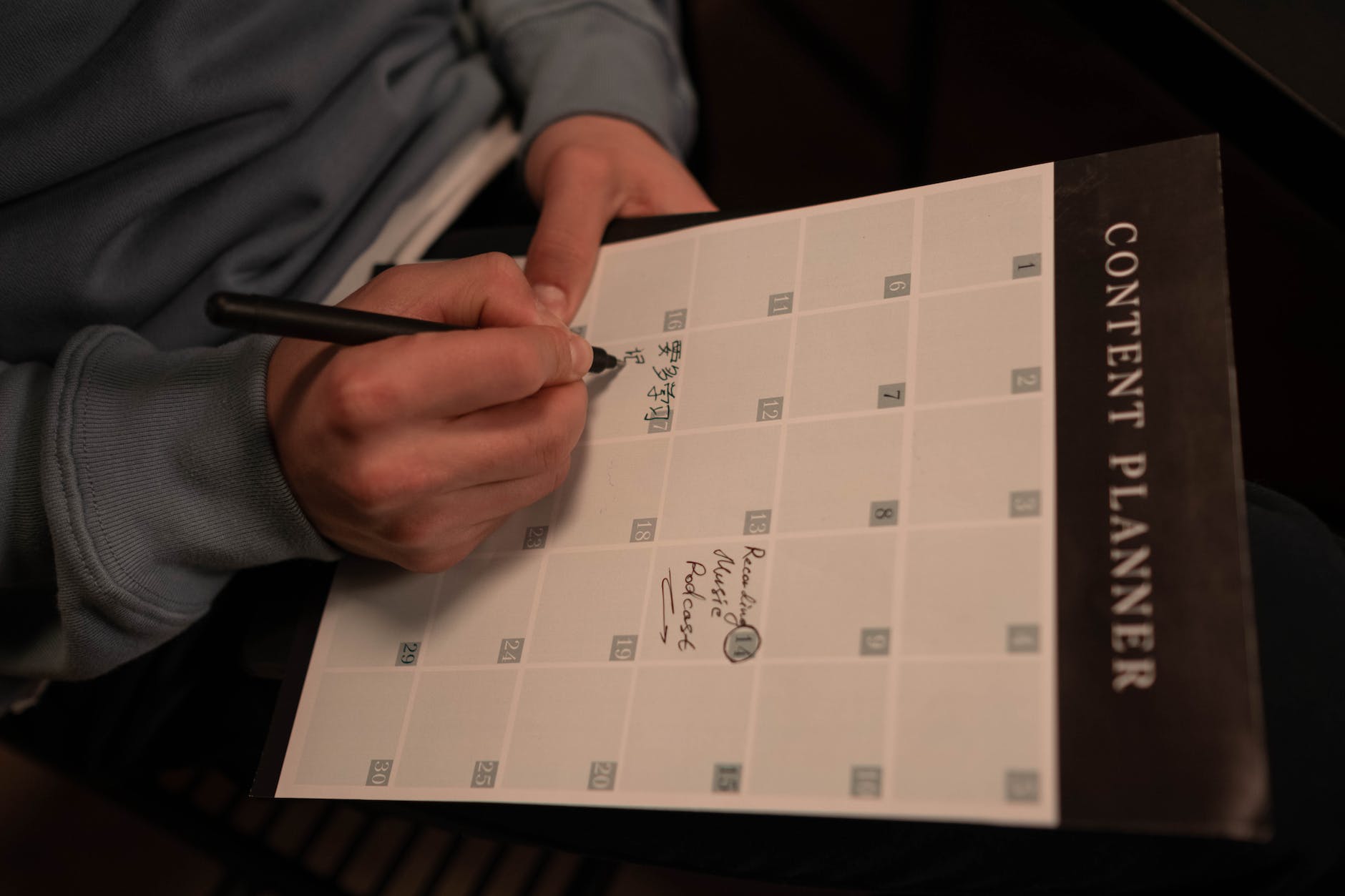
Qualities of a Good Writer’s Notebook:
Before we get started on why you need a writer’s notebook, let’s investigate the “How?” You first need to purchase a high quality notebook. Well, you don’t really need to. You can buy a simple composition notebook from the grocery store if that’s what you prefer.
However I suggest using a notebook that will last because you might want to keep yours and refer to it often. I usually regret writing in cheap notebooks because they fall apart and I end up having to transfer the notes to a better one anyway.
Features of a High Quality Notebook | Journal:
- Built-in index – so you can locate your notes easily
- Numbered pages – to record in your index
- Dot Grid Pages – I prefer the versatility of dot grid pages. They allow you to draw freely, create tables and charts, or write in neat straight lines.
- Ribbon bookmarks – to mark your place (I prefer to have at least two, but one is sufficient for most writers.)
- Elastic closing strap (doubles as a pen loop!)
- Durable hard cover – to protect your precious words!
- Thick no-bleed pages – so you can scribble as much as want without ruining the page before or after
- Mini pocket folder – to keep scraps and other odds and ends writers seem to attract
My Top Three Notebook Picks:
Learn more about why I love these notebooks here & here.
The Iconic Leuchtturm1917 –
The Classic Moleskine Professional Planner –
The Adorable Scribbles That Matter Notebooks
Learn more about Scribbles That Matter Notebooks here.
Make sure you have some decent writing implements on hand as well. For some more ideas on writing supplies for your writer’s notebook, check out this post!
Five Reasons to Create a Writer’s Notebook

1. Record Your Ideas
This is the most obvious reason to have a writer’s notebook. I have been carrying a notebook with me since I was about seven years old. You never know when your muse will strike.
Keeping a notebook handy at all times ensures you can snare that sneaky devil when she does appear.
2. Work Through Your Ideas
Sometimes you get an idea. You write it down. But you’re not exactly sure where to use it. Or it didn’t manifest completely. Sometimes, you wake up from a dream and have to write it down, only to realize later in the day you have no idea what you were talking about.
This is where your writer’s notebook comes in handy. Take that idea and use as many pages as you need to figure it out.
3. Stimulate Creativity
Sometimes you feel like writing, but your creativity is taking a nap. Use your writer’s notebook to wake it up. You don’t have to be strict about your notebook. It’s not only for words.
There are so many ways to light your creative spark.
If you feel like drawing a picture, do it. Or take a photograph you love and make a beautiful scrapbook page. You could even create a page of creative writing prompts and use one every time you’re feeling a little unmotivated. Try writing a poem if that’s not something you usually do. For more ideas on cures for writer’s block, check out this post.

4. Create Writing Habits
Having a writer’s notebook is a good way to develop writing as a daily routine. Don’t just use it when inspiration hits, or to drag inspiration up from the depths.
Try to write in your notebook at least once a day. If that seems too overwhelming, try doing it three times per week for a month. Then ramp up your writing to every day.
“Just write every day of your life. Read intensely. Then see what happens. Most of my friends who are put on that diet have very pleasant careers.”
– Ray Bradbury
5. Freedom to Focus
I use my writer’s notebook as an escape. I love to write. It’s very therapeutic. Yes, I write for work and for this website. There’s a method to my madness. But sometimes, there isn’t. Sometimes I just write for myself. Those words have blossomed into some of my best work. Having a writer’s notebook is like having a key to your very own world.
Whenever you need an escape, find a quiet place, take out your notebook, and get lost in another world.
How to Create a Writer’s Notebook

Three Simple Steps:
1. Create an Index and Number the Pages
- My best advice is to purchase a notebook that already has these features, like the ones listed in the beginning of this post.
- However, if you don’t want to do that, I highly recommend using the first two-four pages of your notebook as an index.
- To use the index, number your pages (you don’t have to do them all at once, start with the first 25-50 pages). Then record the important pages in your index so you can easily reference them later.
2. Write Down the Habits You Want to Work On
- I use the bullet journal method. So I have a collection page for my writing habits. I then create a habit tracker for each month. This allows me to see what habits need more work and which ones I’m doing well with.
- If you don’t want to use the bullet journal method, that is perfectly OK!
- I suggest saving a few pages at the start of your notebook to use a reference sheets. Use one for your writing habits.
- Check back once in a while to see how you’re doing with your habits.
- Do you need to take steps to implement some more into your writing routine?
- Are others not really helpful?
- Do you need to create space in your life to establish some more writing habits?
- Keeping track of your writing and reading habits will help make you a better writer. It will also make writing less of a chore and more of a fun challenge that you look forward to completing!
3. Divide Your Notebook Into Sections
I’ve found that the best way to do this is to use the bullet journal method to create your writer’s notebook. However, I know not everyone wants to use this method. It’s still a good idea to have sections. This way your ideas will be more organized, and thus easier to find when you need them.
- For a writer’s notebook used only for novels, create sections for:
- World Building
- Characters
- Plot & outlines
- Setting Details
- Premise Ideas
- Moral Argument / Themes
- Editing Notes
- Publishing information, steps, etc…
- If you’re using your notebook for “general writing,” you could create such sections as inspiration, motivation, creativity, daily tasks, writing prompts, poetry, short stories, etc…
- For all my bloggers, some section ideas include post ideas, content strategies, website design elements, major edits to track, social media posting & scheduling, marketing plans, etc…
10 Awesome Ideas to Include in Your Writer’s Notebook

Creative Writing Prompts
- See my post for tons of ideas and writing prompts. Keep a page (or several) of these to pick from when you need some inspiration.
Journal Entries
- I use everything as a journal, even my pocket calendar that I use for appointments and random notes. Journaling is just so relaxing, freeing, and fun!
Novel Planning
- I love these notebooks for my on the go novel planning. They come with sections already built in.
- They’re called Moleskine Chapters, but you don’t have to use them as chapter books.
- I add my own titles for each section such as character names, world building ideas, research notes, etc..
- They come in a variety of sizes from really tiny to quite large.
- I have mid-sized ones for more complex notes, and smaller ones that I stick right into my daily pocket planner.
Awesome Daily Planner (This is the one I use):
Pocket-sized Moleskine Chapter Notebooks:
Research Notes
- I have a few sections in my novel planning notebook for research:
- One where I record the publishing notes, title, and author(s) for each book or website
- Another for all of my quick notes on what I’ve read
- And a third for any ideas that are created through that research
Writing Habits
- In case you didn’t figure it out by now, I’m a major proponent of recording your writing habits. I won’t bore you by repeating the reasons for keeping a writer habit tracker in your notebook. Instead, here’s what mine looks like:

Blogging Notes
- Use your writer’s notebook to amp up your blogging game:
- Keep track of your post ideas
- Schedule your posts for an entire month (or longer if you’re super organized and focused)
- Create a posting & interaction schedule for social media
- Log comments you’ve received
- Record feedback you’ve been given
- Tackle post edits more easily by creating a list of all your posts and marking off the ones you’ve edited already
- Plan your monthly themes for the next 90 days
- Create newsletter content
Freewriting
- If you don’t know what freewriting is, check out my post. Use your writer’s notebook to freewrite whenever you need to. I try to freewrite at least once a week. And whenever I can’t think of something to write, freewriting is my go to stand by writing exercise.
Daily Writing Tasks
- Use your writer’s notebook as a planner for your writing projects. Create daily task lists and mark off the ones you’ve completing. Create a reference page with “all the things” you want to accomplish. This way to can move your tasks from there to your daily lists. You can also add to the Master List whenever you think of something new. Dare I say it again? Bullet Journaling is great way to do this!
Creative Pages
- Use some pages just for creative splurges. Take some photos and make a scrapbook page. Or use a ticket stub from something special and write a short story about it. Draw a picture. Paint something. Not only will you create something to treasure, you can use these as inspiration for your writing later.
Collections
- Not to be confused with the collection pages of bullet journaling. Use a page or two to house all of your quotes. Collection some of your favorite ideas in one place.
I’ve given you all the tools and information you need to create your very own writer’s notebook. But if you’re still not satisfied and want to learn more, check out the additional resources section below.
Love & Light, Nicole
Note: This page may contain affiliate links for which, if an item is purchased, I will receive a small commission at absolutely no extra cost to you. I only ever post links for products that I have used, found helpful, and loved. Thank you for supporting my writing journey so I can continue to help you on yours!




One thought on “You Need a Writer’s Notebook – Here’s Why”